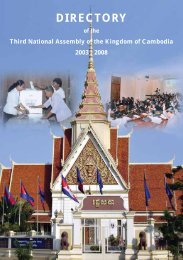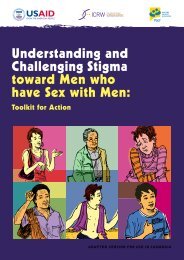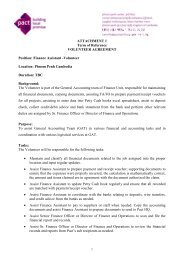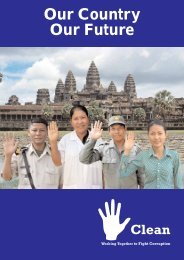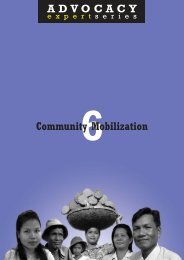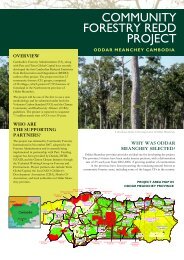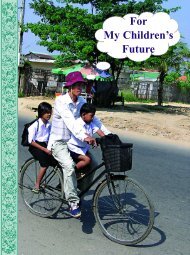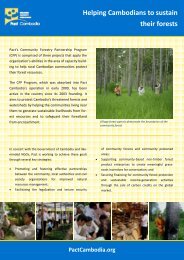Advocacy in Cambodia: Increasing Democratic ... - Pact Cambodia
Advocacy in Cambodia: Increasing Democratic ... - Pact Cambodia
Advocacy in Cambodia: Increasing Democratic ... - Pact Cambodia
You also want an ePaper? Increase the reach of your titles
YUMPU automatically turns print PDFs into web optimized ePapers that Google loves.
communities and NGOs can work with a technical<br />
government department to reach consensus on a<br />
policy, that department will then become the<br />
advocate with the next level of policy makers. At<br />
the same time, it is imperative for NGOs to keep<br />
advocat<strong>in</strong>g at higher levels to re<strong>in</strong>force the work<br />
that has been done at the grassroots level.<br />
NGOs have observed changes <strong>in</strong> the attitude<br />
of government officials at the prov<strong>in</strong>cial level.<br />
When NGOs began work<strong>in</strong>g <strong>in</strong> Kompong Thom,<br />
prov<strong>in</strong>cial and local authorities were not will<strong>in</strong>g<br />
to consider their views. But as credibility of NGOs<br />
has <strong>in</strong>creased over time to address local issues and<br />
local authorities have had a chance to work with<br />
them, they have eased their stance. In more<br />
remote prov<strong>in</strong>ces where there are fewer NGOs,<br />
such as Preah Vihear, officials cont<strong>in</strong>ue to hold<br />
NGOs <strong>in</strong> suspicion and there is little cooperation<br />
regard<strong>in</strong>g advocacy campaigns. In prov<strong>in</strong>ces like<br />
Battambang where there are<br />
many NGOs however, there<br />
is strong cooperation<br />
between communities,<br />
NGOs, authorities, and other<br />
actors, though this<br />
communication may not be<br />
formal or strategic.<br />
It is too soon to assess<br />
at this time to what degree<br />
policy makers have changed<br />
their attitudes and beliefs about the <strong>in</strong>clusion of<br />
civil society groups <strong>in</strong> policy formulation. It would<br />
be useful for advocates with<strong>in</strong> a sector to develop<br />
short-term <strong>in</strong>dicators to monitor the commitment<br />
of government officials to engage, i.e. whether<br />
officials attend public forums, keep an issue on<br />
their agenda, <strong>in</strong>corporate NGO feedback, and/or<br />
vote on policy issues. In the meantime, it is<br />
important for NGOs to approach the government<br />
diplomatically and cont<strong>in</strong>uously f<strong>in</strong>d<br />
opportunities for engagement.<br />
Another aspect of widen<strong>in</strong>g the democratic<br />
space is by <strong>in</strong>creas<strong>in</strong>g public expectation of elected<br />
officials and civil servants. In this area NGOs have<br />
done much to raise awareness about rights and<br />
responsibilities. For example, corruption is<br />
referred to openly now, whereas once it was a<br />
forbidden topic that everyone knew about but<br />
nobody spoke of publicly. Changes <strong>in</strong> attitudes<br />
have occurred due to programs such as the Center<br />
for Social Development’s anti-corruption<br />
campaign. By re<strong>in</strong>forc<strong>in</strong>g higher public<br />
expectations and lobby<strong>in</strong>g for <strong>in</strong>creased access to<br />
public <strong>in</strong>formation – particularly through<br />
commune councils — NGOs can cont<strong>in</strong>ue to<br />
enlarge the democratic space.<br />
By re<strong>in</strong>forc<strong>in</strong>g higher public expectations<br />
and lobby<strong>in</strong>g for <strong>in</strong>creased access to public<br />
<strong>in</strong>formation – particularly through<br />
commune councils — NGOs can cont<strong>in</strong>ue<br />
to enlarge the democratic space.<br />
Build<strong>in</strong>g Susta<strong>in</strong>able <strong>Advocacy</strong> Capacity<br />
Capacity areas that assist advocacy<br />
campaigns <strong>in</strong>clude research, plann<strong>in</strong>g, mobiliz<strong>in</strong>g,<br />
network<strong>in</strong>g, court<strong>in</strong>g the media, lobby<strong>in</strong>g, and<br />
formulat<strong>in</strong>g policy.<br />
A number of advocacy capacity build<strong>in</strong>g<br />
activities have been organized <strong>in</strong> <strong>Cambodia</strong> over<br />
the past few years. These <strong>in</strong>clude various tra<strong>in</strong><strong>in</strong>g<br />
courses conducted by the NGO Forum on<br />
<strong>Cambodia</strong> and Star Kampuchea to improve<br />
advocacy skills. Advocates have appreciated<br />
exposure trips to countries like Timor, India, and<br />
the Philipp<strong>in</strong>es because of the strategies they<br />
observed firsthand. Star Kampuchea fostered four<br />
prov<strong>in</strong>cial advocacy networks <strong>in</strong> addition to<br />
promot<strong>in</strong>g advocacy to its regular membership.<br />
The NGO Forum also fosters forums on civil<br />
society, gender, the environment, and<br />
development issues. Occasionally a donor assigns<br />
an advocacy or media<br />
advisor to assist a sector, as<br />
<strong>in</strong> the case of the Commune<br />
Council Election Law<br />
lobby<strong>in</strong>g.<br />
Individuals, Interest<br />
Groups, and Grassroots<br />
Organizations<br />
Susta<strong>in</strong>able advocacy<br />
depends on develop<strong>in</strong>g capacity at the local level.<br />
Future capacity build<strong>in</strong>g efforts should focus on<br />
widen<strong>in</strong>g the base of associations that are active<br />
and work<strong>in</strong>g on community issues as they arise.<br />
In the future we can expect the role of NGOs to<br />
shift to conduct<strong>in</strong>g research and support<strong>in</strong>g<br />
community leaders with other more sophisticated<br />
skills.<br />
Capacity of advocates and community<br />
leaders cont<strong>in</strong>ues to be limited, although NGOs<br />
are beg<strong>in</strong>n<strong>in</strong>g to focus more attention on this area.<br />
There have been <strong>in</strong>stances <strong>in</strong> which a few local<br />
activists have lobbied at the national level, and<br />
communities have demonstrated <strong>in</strong> front of the<br />
National Assembly. Organized communities are<br />
<strong>in</strong>creas<strong>in</strong>gly able to mobilize around issues and<br />
even <strong>in</strong>form the press of events <strong>in</strong> their areas.<br />
A positive example of community capacity<br />
build<strong>in</strong>g is <strong>in</strong> the urban sector. Organized urban<br />
poor communities are learn<strong>in</strong>g to lobby khan<br />
(district) authorities to improve <strong>in</strong>frastructure <strong>in</strong><br />
the areas <strong>in</strong> which they live. The provision of<br />
technical assistance by groups like URC is an<br />
important factor <strong>in</strong> empower<strong>in</strong>g organized<br />
communities.<br />
NGOs<br />
A number of NGOs are becom<strong>in</strong>g strong<br />
Increas<strong>in</strong>g <strong>Democratic</strong> Space<br />
31



